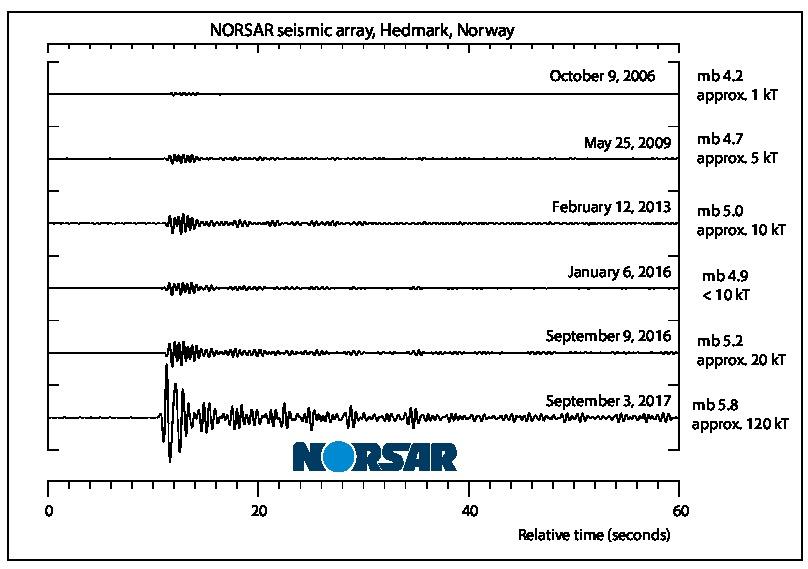North Korea: slouching towards Bethlehem?
Posted By Rod Lyon on September 5, 2017 @ 06:00

North Korea’s sixth nuclear test is easily its most impressive. The fifth—in September last year—involved the detonation of a device similar in yield to the bomb the Americans dropped on Hiroshima in 1945. The latest test features a substantially larger yield. Seismic signals are an imperfect indicator, but estimates currently range from about 70 kilotons all the way up to about 500 kilotons. It’s possible, but not certain, that the test featured a genuine thermonuclear device, a second-generation nuclear-weapon design in which a primary fission explosion ignites a secondary fusion stage. If any radionuclides have leaked from the test site, we’ll get a better picture of the explosion, but that could be some weeks away.
Still, the big conclusions are relatively straightforward. First, North Korea’s nuclear capabilities are no longer constrained to the detonation of relatively low-yield fission devices. The days are over when we could depict the North Korean nuclear program as merely the equivalent of the US program in 1945. Second, when the results from the sixth nuclear test are placed alongside the large strides that Pyongyang has made recently in ballistic-missile development, we’re fast approaching a crunch point where something must be done to corral the North’s nuclear arsenal. A fresh bout of hand-wringing and garment-rending—even another bout of sanctions—is probably not going to give us much leverage on the problem.
Each test, whether of missile or nuclear weapon, gradually builds North Korea’s capacities. True, none of the individual tests is a back-breaker by itself. But the broader programs are breaking the back of global and regional order. That’s because a North Korea equipped with nuclear-armed ICBMs is simply unacceptable. It’s unacceptable at the global level because a pariah state can’t be allowed to hold a sword over the head of the international community. And at the regional level, an emboldened North Korea will destabilise Northeast Asia—corroding the US’s Asian alliances and likely begetting a new wave of proliferation by latent nuclear states.
In brief, if North Korea keeps going down the path it’s currently taking, the outcomes are intolerable. A North Korea that had a slow-moving nuclear-weapons program boasting only limited reach was a tolerable threat. Regional nuclear competitions are relatively common—not to the point where we can become blasé about them, true, but still relatively common. Today’s North Korea has morphed into something much more deadly. It’s the sole nuclear-armed state outside the P5 that seeks intercontinental-range destructive capabilities. And yet it’s the nuclear-armed non-P5 state with the least equity in the international order.
Some argue that North Korea seeks nuclear weapons because of insecurity; that it’s fear of attack and invasion that’s the principal driver of Pyongyang’s WMD programs. Frankly, that argument’s not convincing. Security concerns might be sufficient to drive a small nuclear-weapons program, but not the one that now confronts us. Rather, Pyongyang seeks nuclear weapons as a status symbol, as the price of entry to the only one of the world’s exclusive clubs to which it might actually gain admittance. ICBM-equipped nuclear powers number only four: the US, Russia, China and North Korea. Kim Jong-un seeks international recognition on the basis of the only achievement his regime can boast—the development of a capability to pull down the global order on a day of his choosing.
Reversing that development is now an issue of urgency. I’d like to think that doing so might offer an occasion for international cooperation, because responsible great powers should share the judgement that having intercontinental-range nuclear weapons in the hands of a pariah state is an unacceptable condition. Still, the prevailing geopolitical winds scarcely seem conducive to such an outcome. And there’s a fair degree of slack in the steering wheel of US global leadership with President Trump in the White House.
But if we’re prepared to admit North Korea into the ranks of the world’s ICBM-equipped states, what’s the basis for denying that status to any future proliferator? Some years back, Robert O’Neill observed that ‘the bomb’ had successfully escaped the hands of first the superpowers, and then the great powers, to come to rest in the hands of the world’s underdogs [1]. Accepting that the underdogs can wreak nuclear havoc at intercontinental ranges seems to drag us even closer to the abyss.
In one important respect, of course, nothing has changed after the sixth nuclear test: we still don’t have any easy options for reversing North Korea’s nuclear and missile programs. Kinetic options look costly, non-kinetic options ineffective. But doing nothing will be worse. A crisis postponed is not necessarily a crisis averted. A future North Korea would have more and better nuclear warheads, greater numbers of delivery vehicles, and proven nuclear technologies ready to be sold to the highest bidder.
Article printed from The Strategist: https://aspistrategist.ru
URL to article: /north-korea-slouching-towards-bethlehem/
URLs in this post:
[1] in the hands of the world’s underdogs: https://global.oup.com/academic/product/alternative-nuclear-futures-9780198296249?cc=au&lang=en&
Click here to print.